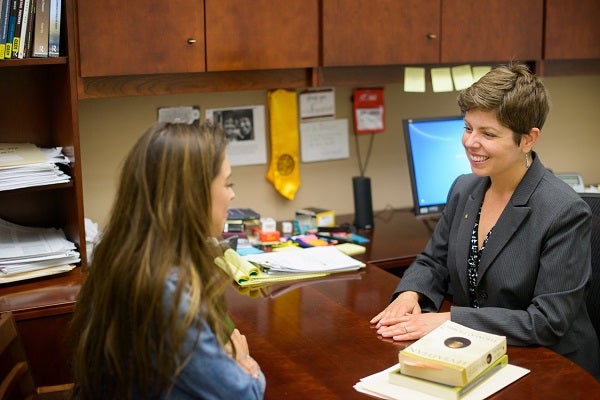Turn the tables: Interview the professional
Picking a career field can be a daunting task for students. Fortunately, Sun Devils have the opportunity to connect with and talk to professionals in their field of interest.
ASU’s Career and Professional Development Services offers the ASU Mentor Network, a platform where current students, alumni and industry professionals can connect with one another to discuss career paths, hiring processes or even course selection.
Sun Devils can browse through the mentor community by major, industry that they would like to know more about or by state or country. Once they have found a mentor they would like to connect with, they can reach out and introduce themselves via the messaging feature embedded into the platform.

Informational interviews are a great way to make connections and to learn about different industry opportunities in your career field.
First-generation college student Leslie Flores, a sophomore studying business entrepreneurship, believes that having a mentor is very important.
“I think it's important to have a mentor because for lots of students, particularly first-generation students like myself, this college experience is new and we don't have that experience networking or advocating for ourselves and [our] future. Having a mentor is our personal guide and insight into our specific field,” Flores said.
Flores encourages all students to try out the ASU Mentor Network because it can change your college experience.
The ASU Mentor Network is not only rewarding to the students but to the mentors as well. There are nearly 5,000 professionals and ASU alumni who are excited to work with students to help them reach their full potential. They know what it is like to be in the students’ shoes and want to make that experience easier.
Logan Rhind, a development officer for the ASU Foundation, knows the value of mentorship and is thankful he had people to lean on when he was in college. It is what made him choose to become a mentor.
“The most rewarding part of being a mentor for me is connecting with people who might be stuck in their own minds and are having a difficult time making decisions. In those instances, I hope that by sharing my perspective and experiences with them, they can see how the mistakes I have made forced me to grow and achieve new heights in my personal and professional lives,” Rhind said.
Along with having a mentor comes the opportunity to network among the industry that students are interested in. CPDS encourages students to conduct informational interviews with industry professionals. These interviews are conducted by the students or job-seekers; you find professionals you want to emulate and ask for their insight on the path to success. The roles are reversed, and the potential interviewee becomes the interviewer; it is a great opportunity to learn more about career paths and job descriptions.
Dr. Janet Jacobsen, an instructor for the Hugh Downs School of Human Communication, is a strong proponent of informational interviews. One of the tasks she assigns her students is to conduct an informational interview with a professional who is in the position that students wanted to be in someday.
“I ask my students to interview someone who has their dream job. That way they know what it takes to get there. People remember what it was like being young and entering the professional world. They want to make sure that the people entering their field know what it entails and are prepared for it,” Jacobsen said.
Some of the questions you might ask during an informational interview would be “what does your day-to-day work schedule look like?” or “what internships or organizations would be ideal for me to pursue?” or “what was your path to get to this position?” or “do you think I need more training or a graduate degree to follow a path similar to yours?”
Students can interview their mentor or their mentor’s colleagues to get insight on their dream job. You'll not only get great insight but be able to rule out jobs that may not be a great fit, and you'll expand your network at the same time.
“Career Services are a wonderful group of people who can help students get connected to professionals. They have a tremendous amount of resources ready for students to use to get them on the right path,” Jacobsen said.
To know more about the ASU Mentor Network, visit mentorship.asu.edu and get connected with the right person. Who knows? It can be the start of an everlasting mentorship and the gateway to your dream job.